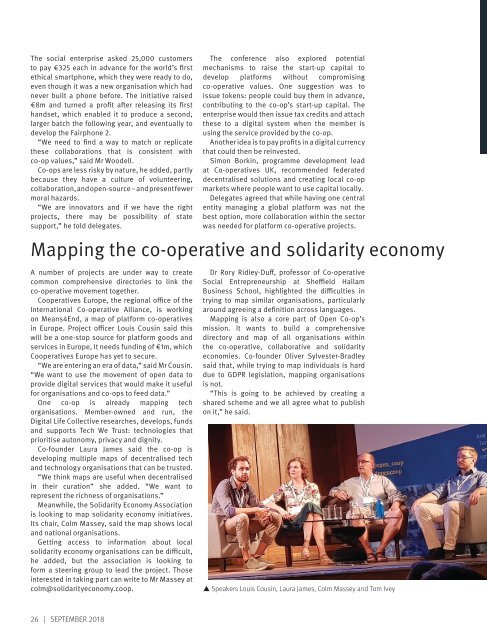SEPTEMBER 2018
The September edition of Co-op News looks at how co-ops cab maintain co-operative values and principles while operating in competitive markets and how this can be a challenge for large co-ops. We examine current research into what influences a co-op’s take on the traditional values of self-help, self-responsibility, democracy, equality, equity and solidarity.
The September edition of Co-op News looks at how co-ops cab maintain co-operative values and principles while operating in competitive markets and how this can be a challenge for large co-ops. We examine current research into what influences a co-op’s take on the traditional values of self-help, self-responsibility, democracy, equality, equity and solidarity.
You also want an ePaper? Increase the reach of your titles
YUMPU automatically turns print PDFs into web optimized ePapers that Google loves.
The social enterprise asked 25,000 customers<br />
to pay €325 each in advance for the world’s first<br />
ethical smartphone, which they were ready to do,<br />
even though it was a new organisation which had<br />
never built a phone before. The initiative raised<br />
€8m and turned a profit after releasing its first<br />
handset, which enabled it to produce a second,<br />
larger batch the following year, and eventually to<br />
develop the Fairphone 2.<br />
“We need to find a way to match or replicate<br />
these collaborations that is consistent with<br />
co-op values,” said Mr Woodell.<br />
Co-ops are less risky by nature, he added, partly<br />
because they have a culture of volunteering,<br />
collaboration, and open-source – and present fewer<br />
moral hazards.<br />
“We are innovators and if we have the right<br />
projects, there may be possibility of state<br />
support,” he told delegates.<br />
The conference also explored potential<br />
mechanisms to raise the start-up capital to<br />
develop platforms without compromising<br />
co-operative values. One suggestion was to<br />
issue tokens: people could buy them in advance,<br />
contributing to the co-op’s start-up capital. The<br />
enterprise would then issue tax credits and attach<br />
these to a digital system when the member is<br />
using the service provided by the co-op.<br />
Another idea is to pay profits in a digital currency<br />
that could then be reinvested.<br />
Simon Borkin, programme development lead<br />
at Co-operatives UK, recommended federated<br />
decentralised solutions and creating local co-op<br />
markets where people want to use capital locally.<br />
Delegates agreed that while having one central<br />
entity managing a global platform was not the<br />
best option, more collaboration within the sector<br />
was needed for platform co-operative projects.<br />
Mapping the co-operative and solidarity economy<br />
A number of projects are under way to create<br />
common comprehensive directories to link the<br />
co-operative movement together.<br />
Cooperatives Europe, the regional office of the<br />
International Co-operative Alliance, is working<br />
on Means4End, a map of platform co-operatives<br />
in Europe. Project officer Louis Cousin said this<br />
will be a one-stop source for platform goods and<br />
services in Europe, It needs funding of €1m, which<br />
Cooperatives Europe has yet to secure.<br />
“We are entering an era of data,” said Mr Cousin.<br />
“We want to use the movement of open data to<br />
provide digital services that would make it useful<br />
for organisations and co-ops to feed data.”<br />
One co-op is already mapping tech<br />
organisations. Member-owned and run, the<br />
Digital Life Collective researches, develops, funds<br />
and supports Tech We Trust: technologies that<br />
prioritise autonomy, privacy and dignity.<br />
Co-founder Laura James said the co-op is<br />
developing multiple maps of decentralised tech<br />
and technology organisations that can be trusted.<br />
“We think maps are useful when decentralised<br />
in their curation” she added. “We want to<br />
represent the richness of organisations.”<br />
Meanwhile, the Solidarity Economy Association<br />
is looking to map solidarity economy initiatives.<br />
Its chair, Colm Massey, said the map shows local<br />
and national organisations.<br />
Getting access to information about local<br />
solidarity economy organisations can be difficult,<br />
he added, but the association is looking to<br />
form a steering group to lead the project. Those<br />
interested in taking part can write to Mr Massey at<br />
colm@solidarityeconomy.coop.<br />
Dr Rory Ridley-Duff, professor of Co-operative<br />
Social Entrepreneurship at Sheffield Hallam<br />
Business School, highlighted the difficulties in<br />
trying to map similar organisations, particularly<br />
around agreeing a definition across languages.<br />
Mapping is also a core part of Open Co-op’s<br />
mission. It wants to build a comprehensive<br />
directory and map of all organisations within<br />
the co-operative, collaborative and solidarity<br />
economies. Co-founder Oliver Sylvester-Bradley<br />
said that, while trying to map individuals is hard<br />
due to GDPR legislation, mapping organisations<br />
is not.<br />
“This is going to be achieved by creating a<br />
shared scheme and we all agree what to publish<br />
on it,” he said.<br />
p Speakers Louis Cousin, Laura James, Colm Massey and Tom Ivey<br />
26 | <strong>SEPTEMBER</strong> <strong>2018</strong>


















